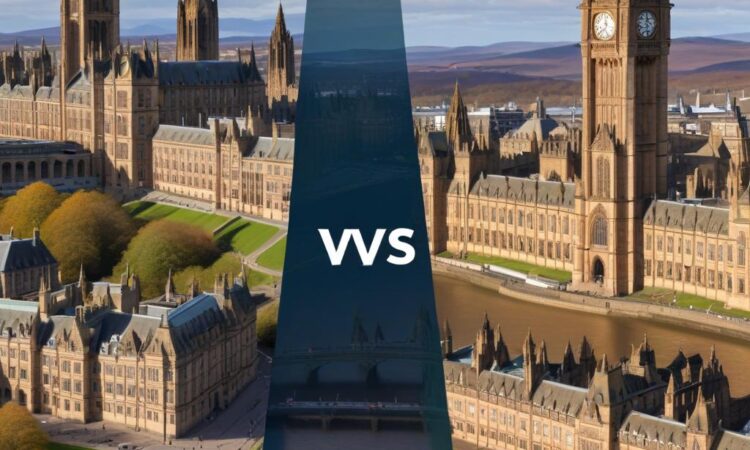Treasury to give Scotland \u00a3300m as tax hike compensation: UK government says SNP have \”no more excuses\”
The UK government has announced it will provide Scotland with \u00a3300 million in compensation for the impact of tax increases implemented by the UK Treasury. This announcement comes amidst ongoing tension between the UK and Scottish governments over fiscal policy and devolved powers. The UK government claims this financial injection removes any remaining obstacles for the Scottish National Party (SNP) in delivering on their policy commitments. However, the Scottish government has countered this assertion, claiming the actual cost of the UK Treasury’s actions will amount to a significant \u00a3500 million loss for Scotland.
The disparity between the figures offered by the UK and Scottish governments highlights the complexities inherent in the devolution settlement. While the UK government insists the \u00a3300 million adequately compensates Scotland for the financial burden imposed by recent tax changes, Scottish ministers argue this figure falls significantly short of covering the real cost, leaving a substantial shortfall in their budget. This difference in assessment stems from differing calculations of the impact of the tax increases on the Scottish economy and the specific revenue streams affected.
The UK government\u2019s statement emphasizes that this financial package should alleviate any lingering concerns and allow the Scottish government to proceed with its planned budgetary allocations without further impediment. The statement further asserts that the SNP now has \”no more excuses\” for failing to deliver on its promises, suggesting that the financial compensation effectively eliminates any budgetary constraints that might have previously hindered their policy implementation.
However, the Scottish government has responded critically to this characterization. Scottish ministers have publicly stated their belief that the \u00a3300 million offered is insufficient to offset the negative consequences of the UK Treasury’s tax policy decisions. They maintain that the increased tax burden will impact a range of public services and vital infrastructure projects, ultimately harming Scotland’s economy and the wellbeing of its citizens. The Scottish government has highlighted the need for a more comprehensive assessment of the impact of these tax changes and argues that a significantly larger financial package is necessary to fully compensate for the losses incurred.
The ongoing dispute underscores the persistent challenges in navigating the relationship between the UK and Scottish governments. The contrasting interpretations of the financial implications of the tax hikes emphasize the complexities involved in fiscal devolution and highlight the potential for disagreements over the allocation of resources and the assessment of financial impacts. Both governments appear steadfast in their positions, suggesting that further negotiations and potential political maneuvering may be needed to resolve the discrepancy in their estimations.
Economists have offered varied perspectives on the matter, with some supporting the UK government’s assessment and others aligning with the Scottish government’s claims. The differing analyses often stem from different methodologies employed in calculating the economic impact of the tax changes, as well as assumptions made about the flexibility of the Scottish government’s budget and its capacity to absorb financial shocks. This divergence in expert opinion further complicates the already tense political climate surrounding the issue.
The political implications of this dispute extend beyond the immediate financial considerations. The conflicting claims regarding the adequacy of the compensation package are likely to fuel ongoing debates about the future of the devolution settlement and the extent of Scotland’s fiscal autonomy. The outcome of this disagreement could have significant implications for future intergovernmental relations and the broader political landscape in the UK.
This ongoing financial dispute is likely to remain a central point of contention between the UK and Scottish governments in the coming months. Further negotiations and potential legal challenges are anticipated as both sides seek to defend their positions and secure the most favorable outcome. The long-term implications of this disagreement for the devolution settlement and the political relationship between Scotland and the rest of the UK remain uncertain.
The debate highlights the intricate complexities of fiscal devolution and the challenges inherent in balancing the financial interests and policy objectives of different levels of government. The ongoing disagreement underscores the need for clearer mechanisms to resolve future disputes and ensure a more equitable and transparent system of fiscal transfer and resource allocation between the UK and Scottish governments. The lack of a clear and universally accepted methodology for assessing the impact of UK-wide tax policies on the devolved administrations remains a significant challenge.
Further analysis and discussion are needed to fully understand the economic consequences of the UK Treasury’s decisions and the implications for Scotland’s public services and infrastructure. The ongoing debate will undoubtedly shape the political landscape in Scotland and influence future discussions on fiscal autonomy and the devolution settlement. The search for a solution that addresses the concerns of both the UK and Scottish governments requires careful consideration of the complexities involved and a commitment to finding a compromise that serves the best interests of the entire country.
The \u00a3300 million compensation package, while substantial, remains a focal point of disagreement. The very act of framing the compensation as a resolution to the Scottish government’s concerns, rather than a partial mitigation, is itself a point of contention. The narrative presented by both sides\u2014one emphasizing resolution, the other highlighting a significant shortfall\u2014illustrates the inherent challenges in achieving consensus in the context of devolved governance.
The contrasting perspectives on the impact of the tax increases and the adequacy of the compensation highlight a deeper underlying tension concerning fiscal accountability and the balance of power within the devolution settlement. The dispute serves as a stark reminder of the ongoing complexities inherent in navigating the multifaceted relationship between the UK and Scottish governments.
This ongoing saga will undoubtedly continue to play out in the political arena, shaping public discourse and influencing policy debates for the foreseeable future. The outcome will have significant implications for the devolution settlement and the broader political landscape of the United Kingdom.

